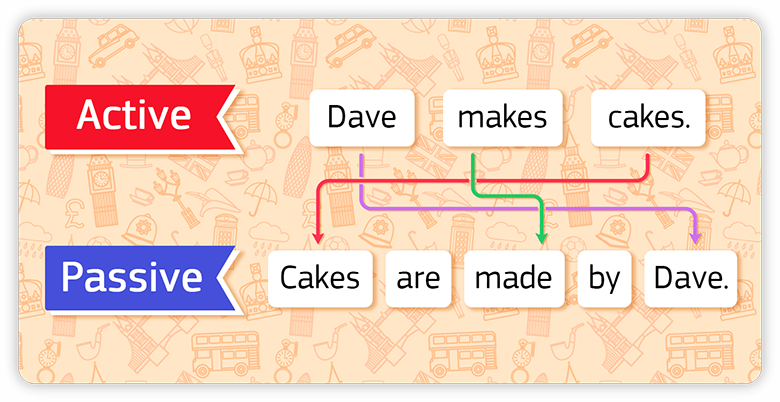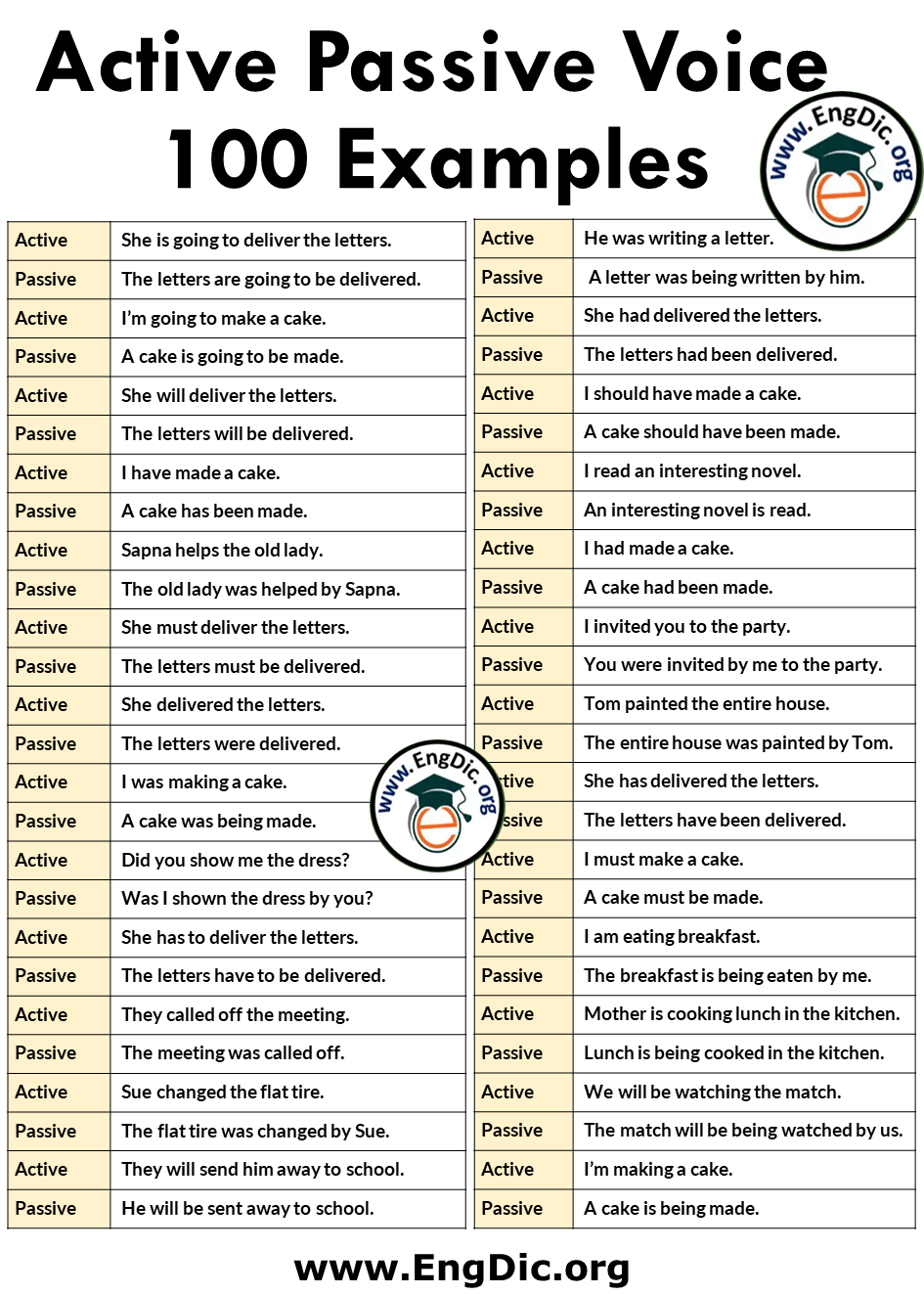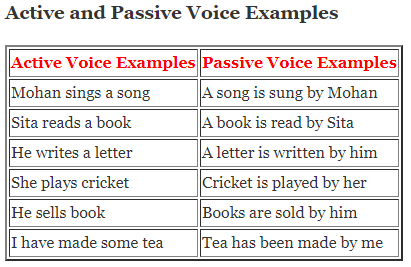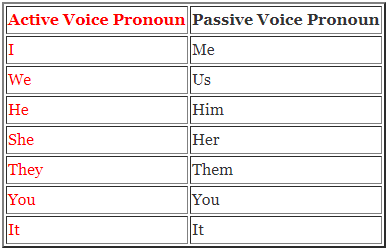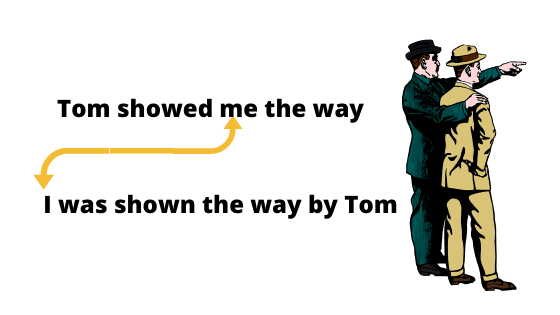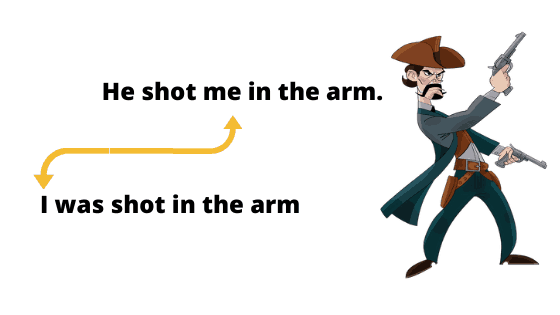Пассивный залог Passive Voice в английском языке употребляется в случаях, когда тот, кто совершает действие, не известен или не важен, или когда результат и действие более интересны, чем исполнитель.
Ниже мы рассмотрим 80 примеров предложений в страдательном залоге в разных временах с переводом.
Примеры предложений в Present Simple Passive
Формула страдательного залога в Present Simple:
am/is/are + V3/V-ed
| Предложение на английском | Перевод на русский |
| Toyota cars are made in Japan. | Машины Тойота сделаны в Японии. |
| The floors are covered with carpets. | Полы покрыты коврами. |
| This jam is made of fresh strawberries. | Этот джем сделан из свежей клубники. |
| The film is based on real life events. | Фильм основан на реальных событиях. |
| This jacket is made of leather. | Эта куртка сделана из кожи. |
| The children are looked after by a nanny. | За детьми приглядывает няня. |
| The garden is taken care of by a gardener. | За садом ухаживает садовник. |
| The letters are delivered to Mr. Brown every morning. | Письма доставляются мистеру Брауну каждое утро. |
| The house is cleaned weekly by a maid. | Дом моется еженедельно домработницей. |
| Italian is spoken in Italy. | На итальянском говорят в Италии. |
Примеры предложений в Present Continuous Passive
Формула Passive Voice в Present Continuous:
am/is/are being+ V3/V-ed
| Предложение на английском | Перевод на русский |
| My car is being fixed by a mechanic. | Мою машину ремонтирует механик. |
| Dinner is being served on the terrace. | Ужин подают на террасе. |
| The house across the street is being built. | Дом на той стороне улицы строится. |
| Are you being helped by anyone? | Вам кто-то помогает? |
| The boats are being cleaned by the men. | Лодки моют мужчины. |
| The cake is being made by Anna. | Торт готовится Анной. |
| The flowers are being watered. | Цветы поливают. |
| The sweater is being knitted by grandmother. | Свитер вяжет бабушка. |
| English is being spoken in the hall. | В зале говорят на английском. |
| Our luggage is being checked by the officers. | Наш багаж проверяют офицеры. |
Смотрите также:
- Упражнения на косвенную речь в английском
- Тест на неправильные глаголы с ответами
Примеры предложений в Present Perfect Passive
Формула пассивного залога в Present Perfect:
have/has been+ V3/V-ed
| Предложение на английском | Перевод на русский |
| The building has just been renovated. | Здание только что отреставрировано. |
| The article hasn’t been written yet. | Статью еще не написали. |
| The parcel has already been delivered. | Посылка уже доставлена. |
| The work has just been finished. | Работа только что закончена. |
| The missing dog hasn’t been found yet. | Потерявшаяся собака еще не найдена. |
| The text has been translated by James. | Текст переведен Джеймсом. |
| A new bridge has been built. | Новый мост построен. |
| The house has been decorated for the holidays. | Дом украшен к праздникам. |
| All the dishes have been made by the chef. | Все блюда приготовлены шеф-поваром. |
| The door has been locked by somebody. | Дверь кем-то заперта. |
Предложения в Past Simple Passive
Формула пассивного залога в Past Simple:
was/were+ V3/V-ed
| Предложение на английском | Перевод на русский |
| «Avatar» was directed by James Cameron. | «Аватар» был создан режиссером Джеймсом Кэмероном. |
| Hamlet was written by William Shakespeare. | Гамлет был написан У. Шекспиром. |
| This palace was built 120 year ago. | Этот дворец был построен 120 лет назад. |
| Lisa was stung by a bee yesterday. | Лизу ужалила пчела вчера. |
| The boat was carried away by the waves. | Лодку унесло волнами. |
| My bag was stolen a few hours ago. | Мою сумка была украдена несколько часов назад. |
| This chairs were bought at a local market last year. | Этот стул был куплен на местном рынке в прошлом году. |
| The house was sold 20 years ago. | Дом был продан 20 лет назад. |
| The floors were cleaned a few days ago. | Полы были вымыты несколько дней назад. |
| These photos were taken during the trip to the Alps. | Эти фотографии были сделаны во время путешествия в Альпы. |
Примеры в Past Continuous Passive
Формула страдательного залога в Past Continuous:
was/were being + V3/V-ed
| Предложение на английском | Перевод на русский |
| When we arrived, the lawns were being watered. | Когда мы приехали, газоны поливались водой. |
| The story was being told the whole evening. | Эту историю рассказывали весь вечер вчера. |
| Filip was being talked about all day. | О Филипе говорили весь день. |
| The kites were being flown by the children. | Дети запускали воздушных змеев. |
| The bikes were being repaired when we entered the garage. | Велосипеды ремонтировали, когда мы зашли в гараж. |
| The match was being played at a big stadium. | Матч игрался на большом стадионе. |
| English was being taught when I came to the class. | Преподавали английский, когда я пришел в класс. |
| The kids were being hugged at the party by everyone. | Детей обнимали все на вечеринке. |
| The room was being cleaned while we were sitting outside. | Комнату мыли, пока мы сидели на улице. |
| The video was being recorded from 5 to 6 yesterday. | Видео записывали с 5 до 6 вчера. |
Примеры в Past Perfect Passive
Формула пассивного залога в Past Perfect:
had been+ V3/V-ed
| Предложение на английском | Перевод на русский |
| The room looked nice. It had been cleaned. | Комната выглядела красиво. Ее помыли. |
| The soup didn’t taste good. It had been cooked too long. | Суп был невкусным. Он варился слишком долго. |
| They said the window had already been cleaned. | Они сказали, что окно уже было вымыто. |
| The shop was robbed after the bank had been robbed. | Магазин ограбили после того, как ограбили банк. |
| The steak hadn’t been cooked well, so we sent it back to the kitchen. | Стейк был приготовлен плохо, поэтому мы отправили его обратно на кухню. |
| We couldn’t find a hotel because the room had not been booked in advance. | Мы не могли найти отель, потому что номер не был заранее забронирован. |
| The meeting was a mess because it hadn’t been planned by anyone. | Встреча прошла в беспорядке, потому что ее никто не спланировал. |
| The letter had just been delivered when I arrived. | Письмо только что доставили, когда я пришел. |
| Nick had been promoted, so he received an increase in pay. | Ника повысили в должности, поэтому он получил повышение зарплаты. |
| No arrangements had been made before we arrived. | Никаких приготовлений не было сделано до того, как мы приехали. |
Примеры предложений в Future Simple Passive
Формула Passive Voice в Future Simple:
will be + V3/V-ed
| Предложение на английском | Перевод на русский |
| A new movie will be shown on TV tonight. | По телевизору покажут новое кино сегодня вечером. |
| The writer’s book will be published in August. | Книгу писателя опубликуют в августе. |
| The budget money will be spent on renovating the city. | Бюджетные деньги потратят на реновацию города. |
| The pictures will be hung on the wall tomorrow. | Картины повесят на стену завтра. |
| The conversation will be recorded. | Разговор будет записан. |
| The table will be set for 5 people. | Стол будет накрыт на 5 персон. |
| We will be informed about it by e-mail. | Нас проинформируют об этом по электронной почте. |
| The contract will be signed on Monday. | Контракт подпишут в понедельник. |
| The guests will be met at the airport. | Гостей встретят в аэропорту. |
| The car will be washed today. | Машину помоют сегодня. |
| All the letters will be written by the children. | Все письма будут написаны детьми. |
Примеры предложений в пассивном залоге с модальными глаголами
Формула страдательного залога с модальными глаголами:
can/must/should/may/have to be + V3/V-ed
can/must/should/may + have been + V3/V-ed
| Предложение на английском | Перевод на русский |
| The book should be returned to the library as soon as possible. | Книгу следует вернуть в библиотеку как можно скорее. |
| Dogs must be kept on a lead. | Собак должны держать на поводке. |
| The tickets can be bought online. | Билеты можно купить онлайн. |
| The project has to be finished this week. | Проект должен быть завершен на этой неделе. |
| The decision has to be made fast. | Решение должно быть принято быстро. |
| The password must be kept in secret. | Пароль должен храниться в секрете. |
| A phone can be charged here. | Телефон можно зарядить здесь. |
| The door must be locked at all times. | Дверь должна быть заперта всегда. |
| Butter shouldn’t be mixed with water. | Масло не следует мешать с водой. |
| The radio may have been broken. | Радио может быть сломалось. |
| The box can’t be opened before 12. | Коробку нельзя открывать до 12. |
Изучать далее:
- Упражнения на пассивный залог в английском с ответами
- Тест на Passive Voice с ответами
- Тест на определение залога в английском языке
- Упражнения на времена английского языка
В этой статье мы изучим правила образования пассивного залога в английском языке, а также на примерах разберемся в каких случаях он используется.
Далеко не всегда мы можем уточнить, кто выполняет действие, а порой нам это и вовсе не нужно. В таких случаях уместно употреблять пассивный или страдательный залог, который в английском языке называют passive voice. Давайте разберем, что такое passive voice и правила его образования, а затем рассмотрим случаи его употребления.
Образование passive voice
В английском языке существует два залога — активный (active voice) и пассивный или страдательный (passive voice). В активном залоге действие выполняет подлежащее. В пассивном залоге действие происходит над подлежащим. Давайте сравним:
Mary cleans the office every morning. — Мэри убирает офис каждое утро. (активный залог)
Подлежащее (Мэри) выполняет действие (убирает).
The office is cleaned every morning. — Офис убирают каждое утро. (пассивный залог)
Неизвестно, кто выполняет действие. Подлежащее (офис) подвергается действию (его убирают).
She asked her students to come earlier. — Она попросила студентов прийти раньше. (активный залог)
The students were asked to come earlier. — Студентов попросили прийти раньше. (пассивный залог)
Страдательный залог в английском языке образуется с помощью вспомогательного глагола to be и смыслового глагола в третьей форме. На месте подлежащего в утвердительных предложениях будет стоять человек или предмет, над которым будет производиться действие. Посмотрите на схеме ниже, как активный залог можно преобразовать в пассивный.
Образование пассивного залога в разных временах представлено в таблице ниже. Времена группы Perfect Continuous, а также Future Continuous в пассивном залоге не используются.
| Время | Когда используем | Формула | Пример |
|---|---|---|---|
| Present Simple | – регулярное действие – констатация факта |
is/am/are + V3 | Thousands of dollars are spent on coffee in America every day. — Тысячи долларов тратятся на кофе в Америке каждый день. |
| Past Simple | – завершенное действие в прошлом | was/were + V3 | The radio was invented 150 years ago. — Радио изобрели 150 лет назад. |
| Future Simple | – действие произойдет в будущем | will be + V3 | The letter will be sent tomorrow. — Письмо отправят завтра. |
| Present Continuous | – действие происходит в момент речи, прямо сейчас | am/is/are + being + V3 | The car is being refueled now. — Машину заправляют сейчас. |
| Past Continuous | – действие происходило в определенный момент в прошлом, акцент на продолжительности действия | was/were + being + V3 | The exam was being taken yesterday morning. — Экзамен сдавали вчера утром. |
| Present Perfect | – действие уже завершилось, акцент на результат | has/have + been + V3 | The flowers have already been watered. — Цветы уже полили. |
| Past Perfect | – действие завершилось до определенного момента или другого события в прошлом | had + been + V3 | The police had been called before the burglars ran away. — Полицию вызвали до того, как воры убежали. |
| Future Perfect | – действие будет завершено до определенного момента в будущем | will + have + been + V3 | The article will have been rewritten by tomorrow morning. — Статью перепишут к завтрашнему утру. |
Для образования отрицательной формы пассивного залога необходима частица not. Ставим ее после вспомогательного глагола. Если вспомогательных глаголов несколько, ставим not после первого.
I left my camera on the bench and it was not stolen! — Я забыл камеру на лавочке, и ее не украли!
The car has not been transported yet. — Машину еще не перевезли.
Чтобы задать вопрос в пассивном залоге, необходимо поставить вспомогательный глагол на первое место.
Will the meeting be held next week? — Встречу проведут на следующей неделе?
Was the match canceled because of the weather? — Матч отменили из-за погоды?
Если есть необходимость указать, кем выполняется действие, в конце предложения ставим предлог by + того, кто выполняет действие.
The book was written by an unknown author. — Книга была написана неизвестным автором.
You will never be disappointed by your loyal employees. — Ты никогда не будешь разочарован своими верными сотрудниками.
Разобраться в сложной грамматической теме вам поможет один из наших опытных преподавателей.
Случаи использования passive voice
- Когда тот, кто выполняет действие, неизвестен, неважен или очевиден. Действие важнее того, кто его совершает.
My project for English literature is ruined! Who did it? — Мой проект по английской литературе испорчен! Кто это сделал?
Your delegation will be met at the airport. You will see a card with your name. — Вашу делегацию встретят в аэропорту. Вы увидите карточку с вашим именем.
You may go to your room. Your suitcase will be taken there in a minute. — Вы можете проходить в свою комнату. Ваш чемодан принесут туда через минуту. - Когда описываем действие в новостях, заголовках, рекламных объявлениях.
The local shop was robbed this morning. — Местный магазин ограбили этим утром.
A big discount will be provided for the first ten customers. — Большая скидка будет предоставлена первым десяти покупателям. - Когда описываем общие факты, идеи, мнения.
Quentin Tarantino is known all around the world. — Квентина Тарантино знают по всему миру.
His picture was described as the best artwork of the past year. — Его картина была описана, как лучшая работа прошедшего года. - Когда хотим сделать высказывание более вежливым или формальным.
Have you cancelled the meeting? — Ты отменил встречу? (прямой вопрос)
Has the meeting been cancelled? — Встречу отменили? (более вежливый вопрос).You haven’t paid for electricity since January! — Вы не платите за электричество с января!
The electricity hasn’t been paid for since January. — За электричество не платят с января.
Другие формы passive voice
Разберем, в каких еще формах и конструкциях можно употреблять страдательный залог.
- Пассивный залог также используется в следующих вариантах:
Форма Формула Пример Present Infinitive to be + V3 She hopes to be invited to the party. — Она надеется, что ее пригласят на вечеринку. They expect the work to be done by the weekend. — Они ожидают, что работу закончат к выходным.
Perfect Infinitive to have been + V3 He pretended to have been given money. — Он притворился, что ему дали деньги. He was really surprised to have been granted a certificate. — Он был очень удивлен, что ему выдали сертификат.
-ing form being + V3 Nobody likes being treated badly. — Никому не нравится, когда с ним обращаются плохо. I hate being told what to do. — Я ненавижу, когда мне говорят, что делать.
Perfect -ing form having been + V3 They admitted having been told about that. — Они признали, что им это говорили. I don’t remember having been asked to help her. — Я не помню, чтобы меня просили ей помочь.
Modals must/can be + V3 This rule must be taken into consideration. — Это правило должно быть принято во внимание. It can be postponed till Tuesday. — Это можно отложить до вторника.
- Глаголы to believe (верить, полагать), to expect (ожидать), to feel (чувствовать), to hope (надеяться), to know (знать), to say (говорить), to think (думать), to report (сообщать, докладывать), to understand (понимать, подразумевать) могут использоваться в пассивном залоге только в двух типах конструкций: impersonal construction, personal construction. Эти конструкции нужны, когда у нас нет необходимости ссылаться на мнение кого-то конкретного. Мы говорим об общеизвестных фактах, общем мнении.
Название конструкции Формула Пример Impersonal construction It + пассивный залог + that-clause It is believed that they are from a very rich family. — Считается, что они из очень богатой семьи. It was expected that they would come on Friday. — Ожидалось, что они приедут в пятницу.
Personal construction Подлежащее + пассивный залог + to + infinitive They are believed to be from a very rich family. — Считается, что они из очень богатой семьи. They were expected to come on Friday. — Ожидалось, что они приедут в пятницу.
Давайте еще раз посмотрим, как из предложений в активном залоге образуются пассивные конструкции.
People say Anna is a gossiper. — Люди говорят, что Анна — сплетница.
It is said that Anna is a gossiper. — Говорят, что Анна — сплетница. (impersonal construction)
Anna is said to be a gossiper. — Говорят, что Анна — сплетница. (personal construction)They know that Eric works for FBI. — Они знают, что Эрик работает на ФБР.
It is known that Eric works for FBI. — Известно, что Эрик работает на ФБР. (impersonal construction)
Eric is known to work for FBI. — Известно, что Эрик работает на ФБР. (personal construction) - Когда действие выполняет кто-то за нас или для нас, используется конструкция have something done. Как правило, речь может идти о предоставлении каких-либо услуг. Предложения с этой конструкцией строятся следующим образом:
Подлежащее + have + дополнение + глагол в 3-ей форме
I did my nails yesterday. — Я сделала маникюр вчера.
I had my nails done yesterday. — Мне сделали маникюр вчера.His parents will build a house tree. — Его родители построят домик на дереве.
They will have their tree house built. — Им построят домик на дереве.Эта конструкция может использоваться в разных временах. В зависимости от времени меняется вспомогательный глагол have.
Время Пример в активном залоге Пример с конструкцией have something done Present Simple She cleans my flat every weekend. — Она убирает мою квартиру каждые выходные. I have my flat cleaned every weekend. — Мою квартиру убирают каждые выходные. Past Simple I sent a parcel. — Я отправил посылку. I had my parcel sent. — Мою посылку отправили. Future Simple We will paint the kitchen. — Мы покрасим кухню. We will have our kitchen painted. — Нам покрасят кухню. Present Continuous They are repairing the road. — Они ремонтируют дорогу. They are having the road repaired. — Им ремонтируют дорогу. Past Continuous We were changing the wheel. — Мы меняли колесо. We were having the wheel changed. — Нам меняли колесо. Future Continuous I will be doing make-up. — Я буду делать макияж. I will be having my make-up done. — Мне будут делать макияж. Present Perfect Our neighbours have just built a fence. — Наши соседи только построили забор. Our neighbours have just had the fence built. — Нашим соседям только построили забор. Present Perfect Continuous I have been washing the car for two hours. — Я мою машину последние два часа. I have been having the car washed for two hours. — Мне два часа моют машину. Past Perfect He had stolen the wallet. — Он украл кошелек. He had had his wallet stolen. — У него украли кошелек. Past Perfect Continuous She had been sewing the dress. — Она шила платье. She had been having the dress sewed. — Ей шили платье. В разговорной речи вспомогательный глагол have часто заменяют на get.
I want to get my purchase delivered. — Я хочу, чтобы мою покупку доставили.
He got the door installed. — Ему установили дверь.
Если хотите научиться уверенно использовать пассивный залог, записывайтесь на наш курс практической грамматики.
Надеемся, наша статья была для вас полезной и вы разобрались в разных формах страдательного залога. Предлагаем пройти небольшой тест.
Тест по теме «Passive voice — правила и примеры»
© 2023 englex.ru, копирование материалов возможно только при указании прямой активной ссылки на первоисточник.
Below are 100 Examples of Active Passive Voice in English. Let us first discuss active and passive voice.
Active and Passive Voice
Active Voice
We use active voice in our daily speech and normal conversation. Active voice is used when we have to describe a situation. We will use active voice when describing a situation from the perspective of the other person. The other person is basically the one performing the action. In active voice, the subject is the person, and action is referred to as the object.
Some examples of active voice are:
- The cat killed the mouse.
- The man cut down the tree.
- Columbus discovered America.
- His teacher praises him
- The boy teased the dog.
Passive Voice
When the object is affected by the action, we use passive voice. A verb is in the passive voice when its form shows that something is done to the person or thing denoted by the subject. The passive voice may be used when the doer is not known or for when for any reason we don’t want to name the doer.
Some Examples of Passive Voice are:
- He was praised by his father.
- The horse was frightened by the noise.
- Now a word was spoken by Sara.
- The road was lined with people.
100 Examples of Active and Passive Voice
Below are examples of active voice and passive voice:
Active Voice:– She is going to deliver the letters.
Passive Voice:– The letters are going to be delivered.
–
Active Voice:– I’m going to make a cake.
Passive Voice:– A cake is going to be made.
–
Active Voice:– She will deliver the letters.
Passive Voice:– The letters will be delivered.
–
Active Voice:– I have made a cake.
Passive Voice:– A cake has been made.
–
Active Voice:– Sapna helps the old lady.
Passive Voice:– The old lady was helped by Sapna.
–
Active Voice:– She must deliver the letters.
Passive Voice:– The letters must be delivered.
–
Active Voice:– She delivered the letters.
Passive Voice:– The letters were delivered.
–
Active Voice:– I was making a cake.
Passive Voice:– A cake was being made.
–
Active Voice:– Did you show me the dress?
Passive Voice:– Was I shown the dress by you?
–
Active Voice:– She has to deliver the letters.
Passive Voice:– The letters have to be delivered.
–
Active Voice:– They called off the meeting.
Passive Voice:– The meeting was called off.
–
Active Voice:– Sue changed the flat tire.
Passive Voice:– The flat tire was changed by Sue.
–
Active Voice:– They will send him away to school.
Passive Voice:– He will be sent away to school.
–
Active Voice:– He was writing a letter.
Passive Voice:– A letter was being written by him.
–
Active Voice:– She had delivered the letters.
Passive Voice:– The letters had been delivered.
–
Active Voice:– I should have made a cake.
Passive Voice:– A cake should have been made.
–
Active Voice:– I was playing video games.
Passive Voice:– The video games were being played by me.
–
Active Voice:– The choir really enjoys that piece.
Passive Voice:– That piece is really enjoyed by the choir.
–
Active Voice:– I invited you to the party.
Passive Voice:– You were invited by me to the party.
–
Active Voice:– Tom painted the entire house.
Passive Voice:– The entire house was painted by Tom.
–
Active Voice:– She has delivered the letters.
Passive Voice:– The letters have been delivered.
–
Active Voice:– I must make a cake.
Passive Voice:– A cake must be made.
–
Active Voice:– I am eating breakfast.
Passive Voice:– The breakfast is being eaten by me.
–
Active Voice:– Mother is cooking lunch in the kitchen.
Passive Voice:– Lunch is being cooked in the kitchen.
–
Active Voice:– We will be watching the match.
Passive Voice:– The match will be being watched by us.
–
Active Voice:– I’m making a cake.
Passive Voice:– A cake is being made.
–
Active Voice:– The two kings are signing the treaty.
Passive Voice:– The treaty is being signed by the two kings.
–
Active Voice:– He will play the match.
Passive Voice:– The match will be played
–
Active Voice:– I make a cake.
Passive Voice:– A cake is made.
–
Active Voice:– He loves me.
Passive Voice:– I am loved by him.
–
Active Voice:– Michael is baking a brownie.
Passive Voice:– A brownie is being baked by Michael.
–
Active Voice:– Mark has tricked me.
Passive Voice:– I have been tricked by Mark
–
Active Voice:– I have played the game.
Passive Voice:– A game has been played by me.
–
Active Voice:– She was delivering the letters.
Passive Voice:– The letters were being delivered.
–
Active Voice:– I will make a cake.
Passive Voice:– A cake will be made.
–
Active Voice:– His grandmother looked after him.
Passive Voice:– He was looked after by his grandmother.
–
Active Voice:– She delivers the letters.
Passive Voice:– The letters are delivered.
–
Active Voice:– I made a cake.
Passive Voice:– A cake was made.
–
Active Voice:– She is delivering the letters.
Passive Voice:– The letters are being delivered.
–
Active Voice:– I had made a cake.
Passive Voice:– A cake had been made.
–
Active Voice:– I gave him a book for his birthday.
Passive Voice:– He was given a book for his birthday.
–
Active Voice:– Harry ate six shrimp at dinner.
Passive Voice:– At dinner, six shrimp were eaten by Harry.
–
Active Voice:– Tom painted the entire house.
Passive Voice:– The entire house was painted by Tom.
–
Active Voice:– The mother is feeding the baby.
Passive Voice:– The baby is being fed by the mother.
–
Active Voice:– Mom read the novel in one day.
Passive Voice:– The novel was read by Mom in one day.
–
Active Voice:– I read an interesting novel.
Passive Voice:– An interesting novel is read.
–
Active Voice:– She will deliver the packages.
Passive Voice:– The packages will be delivered by her.
–
Active Voice:– We have published a new magazine.
Passive Voice: – A new magazine has been published.
–
Active Voice:– He is cleaning the room.
Passive Voice:– The room is being cleaned by him.
–
Active Voice:– They will have finished the project by Monday.
Passive Voice:– The project will have been finished by Monday.
–
Active Voice:– I am writing a novel.
Passive Voice:– A novel is being written by me.
–
Active Voice:– I will have made a cake by tomorrow.
Passive Voice:– A cake will have been made by tomorrow.
Active and Passive Voice Chart
| Tense | Active Voice | Passive Voice |
|---|---|---|
| Simple Present | I eat an apple. | An apple is eaten by me. |
| Present Continuous | I am eating an apple. | An apple is being eaten by me. |
| Present Perfect | I have eaten an apple. | An apple has been eaten by me. |
| Present Perfect Continuous | I have been eating an apple. | An apple has been eaten by me. |
| Simple Past | I ate an apple. | An apple was eaten by me. |
| Past Continuous | I was eating an apple. | An apple was being eaten by me. |
| Past Perfect | I had eaten an apple. | An apple had been eaten by me. |
| Past Perfect Continuous | I had been eating an apple. | An apple had been eaten by me. |
| Simple Future | I will eat an apple. | An apple will be eaten by me. |
| Future Continuous | I will be eating an apple. | An apple will be eaten by me. |
| Future Perfect | I will have eaten an apple. | An apple will have been eaten by me. |
| Future Perfect Continuous | I will have been eating an apple. | An apple will have been eaten by me. |
Active and Passive Voice Examples with Answers
Exercise 1: Convert the following sentences from active voice to passive voice.
John ate the pizza.
Passive: The pizza was eaten by John.
The teacher gave the students an assignment.
Passive: An assignment was given to the students by the teacher.
Someone stole my bike.
Passive: My bike was stolen by someone.
The company will release a new product next month.
Passive: A new product will be released by the company next month.
The dog chased the cat.
Passive: The cat was chased by the dog.
Exercise 2: Convert the following sentences from passive voice to active voice.
The cake was baked by Mary.
Active: Mary baked the cake.
The book was written by J.K. Rowling.
Active: J.K. Rowling wrote the book.
The car was repaired by the mechanic.
Active: The mechanic repaired the car.
The film was directed by Steven Spielberg.
Active: Steven Spielberg directed the film.
The letter was typed by Sarah.
Active: Sarah typed the letter.
Download this Lesson in PDF
[DOWNLOAD PDF]
Грамматика
17.12.2020
Passive voice: полный гид по пассивному залогу
Содержание:
-
Что такое пассивный залог?
-
Случаи, в которых используется страдательный залог в английском
-
1. Отсутствие исполнителя
-
2. Действие важнее исполнителя
-
3. Всем известные факты
-
4. Описание приготовления чего-либо.
-
5. Придание вежливости и большей формальности
-
6. Использование в научных докладах
-
7. Неблагоприятное событие
-
Как образуется пассивный залог?
-
Образование отрицательных и вопросительных форм глагола в страдательном залоге
-
Использование модальных глаголов в пассивном залоге
-
Предлоги by и with в страдательном залоге
-
Другие формы пассивного залога
-
To be + III форма смыслового глагола
-
To have been + III форма смыслового глагола
-
Being + III форма смыслового глагола
-
Как сделать из активного залога пассивный?
-
Глаголы с предлогами в Passive Voice
-
Безличные и личные конструкции (impersonal construction, personal construction)
-
Таблица с примерами
-
Исключения
Далеко не всегда человек знает, кто именно совершает действие. Именно для этих случаев существует Passive Voice (по-русски — пассивный залог). В этой статье мы расскажем, что это такое, изучим правила его образования и рассмотрим случаи, когда он употребляется.
Что такое пассивный залог?
В английском языке существует два залога — активный (active voice) и пассивный (passive voice), также его называют страдательным. Пассивный залог — это грамматическая конструкция, которая используется в случаях, когда тот, кто совершает действие, не известен или не важен.
Например:
- Somebody took his personal belongings while he was taking a swim in the pool. — Кто-то взял его личные вещи, пока он плавал в бассейне. — Это активный залог.
Это же предложение в пассивном залоге будет выглядеть так:
- His personal belongings were taken while he was taking a swim in the pool. — Его личные вещи взяли, пока он плавал в бассейне.
Другие примеры использования страдательного залога:
-
The museum is being reconstructed now. — Музей сейчас реконструируют.
-
The pizza had been delivered when he came back home. — Пицца была уже доставлена, когда он вернулся домой.
-
New fitness center will be opened next week. — Новый фитнес-центр откроется на следующей неделе.
-
Her jewelry was stolen yesterday. — Ее украшения были украдены вчера.
Случаи, в которых используется страдательный залог в английском
1. Отсутствие исполнителя
Пассивный залог применяют, если неизвестен тот, кто совершает действие или это не имеет никакого значения. Также исполнитель может быть понятен из контекста.
Примеры:
-
My car has been stolen! — Мою машину украли!
-
This letter was sent to me by someone I don’t know. — Это письмо мне прислал кто-то, кого я не знаю.
-
Your delegation will be met at 6 o’clock. — Вашу делегацию встретят в 6 часов.
2. Действие важнее исполнителя
Такая грамматическая конструкция часто используется в новостных заголовках, объявлениях, деловых письмах, статьях, рекламе или инструкциях, потому что акцент делается на действии, а не на том, кто его исполняет.
Примеры:
-
The art exhibition will be held next week. — Художественная выставка состоится на следующей неделе.
-
Local store salesman was robbed at night. — Ночью был ограблен продавец местного магазина.
-
The gifts will be provided for the first twenty customers. — Подарки будут предоставлены первым двадцати покупателям.
3. Всем известные факты
Используется в английском, когда нужно описать какие-то общеизвестные факты, мнения или идеи.
Примеры:
-
U.S.A president is known all around the world. — Президент США известен по всему миру.
-
This work was described as the most talented in his career. — Эта работа была описана, как самая талантливая в его карьере.
4. Описание приготовления чего-либо.
Примеры:
-
Water is heated and added to the mixture. — Вода нагревается и добавляется к смеси.
-
Еhe onion is fried and then mixed with the meat. — Лук обжаривается, а потом смешивается с мясом.
5. Придание вежливости и большей формальности
Пассивный залог порой может использоваться, чтобы сделать обращение более формальным или вежливым.
Примеры:
-
The electricity hasn’t been paid for since March. — За электричество не платят с марта.
-
Has our meeting been cancelled? — Нашу встречу отменили?
6. Использование в научных докладах
Например:
- A lot of research has been conducted about this mental illness. — Об этом психическом заболевании было проведено множество исследований.
7. Неблагоприятное событие
Пассивный залог нередко используется, чтобы рассказать о каком-либо негативном событии, но не указывать при этом на виновника.
Например:
- The article has been written awfully. – Статья написана ужасно.
Как образуется пассивный залог?
В английском языке страдательный залог образуется при помощи глагола to be в нужной форме в зависимости от времени и смыслового глагола в форме Past Participle (для правильных глаголов +ed / для неправильных глаголов — 3 столбец таблицы (V3)).
|
Время |
Использование |
Формула образования |
Пример |
|
Present Simple |
Действие, которое происходит регулярно. |
is/am/are + V3 |
The kitchen is cleaned every day. — Кухню убирают каждый день. |
|
Past Simple |
Действие, совершенное в прошлом. |
was/were + V3 |
The kitchen was cleaned yesterday. — Кухню убрали вчера. |
|
Future Simple |
Действие, которое может произойти в будущем. |
will be + V3 |
The kitchen will be cleaned tomorrow. — Кухню уберут завтра. |
|
Present Continuous |
Действие происходит в момент речи. |
am/is/are + being + V3 |
The kitchen is being cleaned at the moment. — Кухню убирают прямо сейчас. |
|
Past Continuous |
Действие было в процессе в конкретный момент в прошлом. |
was/were + being + V3 |
The kitchen was being cleaned when she came. — Кухню убирали, когда она пришла. |
|
Present Perfect |
Действие совершилось недавно, но акцент делается на результате. |
has/have + been + V3 |
The kitchen looks so clean! — It has been cleaned recently. / Кухня такая чистая! — Ее недавно убирали. |
|
Past Perfect |
Действие завершилось до определенного момента в прошлом или до того, как другое действие началось. |
had been + V3 |
The kitchen had been cleaned before I came. — На кухне убрали до того, как я пришел. |
|
Future Perfect |
Действие завершится в будущем до определенного момента. |
will + have + been + V3 |
The kitchen will have been cleaned by 4 o’clock. — Кухня будет убрана к 4 часам. |
|
Present Perfect Continuous |
passive voice не используется |
||
|
Past Perfect Continuous |
passive voice не используется |
||
|
Future Perfect Continuous |
passive voice не используется |
Образование отрицательных и вопросительных форм глагола в страдательном залоге
Отрицательная форма пассивного залога образуется при помощи частицы not, которую необходимо поставить после вспомогательного глагола. Если их несколько, то частица ставится после первого.
Примеры:
-
This book was not written by him. — Эта книга была написана не им.
-
I am not often invited to the parties. — Меня нечасто приглашают на вечеринки.
-
He was not accused of stealing the money. — Его не обвиняли в том, что он украл деньги.
-
The gift has not been bought yet. — Подарок еще не привезли.
Вопросительная форма пассивного залога образуется, когда вспомогательный глагол ставится на первое место.
Примеры:
-
Will this book be delivered tomorrow? — Эту книгу доставят завтра?
-
Are you often invited to the parties? — Тебя часто приглашают на вечеринки?
-
Has this task been explained to you? — Вам объяснили это задание?
-
Will the fashion show be held next week? — Модный показ проведут на следующей неделе?
-
Where were you born? – Где ты родился?
Более сложная вопросительно-отрицательная форма образуется с помощью вспомогательного глагола, который ставится перед подлежащим и частицей not, следующей за ним.
Пример:
- Has the book not been written? — Книга не написана?
Также можно использовать сокращенную форму, при которой частица not присоединяется к вспомогательному глаголу.
Например:
-
Isn’t the text written? — Текст не написан?
-
Hasn’t the book been written? — Книга не написана?
Использование модальных глаголов в пассивном залоге
Все модальные глаголы применяются для образования страдательного залога. Происходит это при помощи самого модального глагола, к которому плюсуется be и III форма смыслового глагола. Формула выглядит так:
Modal V + be + Past Participle (V3)
В результате получаются следующие конструкции:
- must be (должен быть);
- have to be (должен быть);
- ought to be (следует быть);
- can be (может быть);
- should be (следует быть);
- be supposed to be (считаться, что; предполагаться, что);
- may be (может быть);
- might be (возможно).
Примеры:
-
He must be taken to the hospital. — Его нужно обязательно доставить в больницу.
-
He had to do this project. – Ему пришлось сделать этот проект.
-
The cake ought to be done soon. — Пирог должен быть скоро готов.
-
The work can be done soon. — Работа может быть сделана в ближайшее время.
-
This task should be done. — Эта задача должна быть выполнена.
-
Gazelles are supposed to be caught by lions. — Предполагается, что газелей ловят львы.
-
The house may be cleaned. — Дом может быть убран.
-
We know there are differing views on whether and how this might be done. — Мы знаем, что есть разные взгляды на то, следует ли это делать и как это можно было бы сделать.
Предлоги by и with в страдательном залоге
Если нужно уточнить кто или что стало причиной действия, следует использовать предлоги by и with.
Примеры:
-
The books about Harry Potter were written by J.K. Rowling. — Книги о Гарри Поттере были написаны Джоан Роулинг.
-
This sculpture was destroyed by unknown person. — Эта скульптура была разрушена неизвестным человеком.
-
The town was ruined by tsunami. — Город был разрушен цунами.
-
Если же нужно сообщить о том, что действие совершается при помощи предмета или орудия, следует использовать предлог with.
Например:
-
The picture was drawn with pencil. — Картина была нарисована карандашом.
-
He was hit with a stone. — Его ударили камнем.
Другие формы пассивного залога
Данная грамматическая конструкция может употреблять еще в нескольких формах.
To be + III форма смыслового глагола
Пример:
She hopes to be chosen for this position. — Она надеется, что ее выберут на эту должность.
To have been + III форма смыслового глагола
Например:
He thought to have been given money. — Он думал, что ему дали деньги.
Being + III форма смыслового глагола
Пример:
I don’t like being told what to do. — Я не люблю, когда мне говорят, что делать.
Как сделать из активного залога пассивный?
Чтобы перевести английское предложение в страдательный залог, нужно поставить члены предложения в ином порядке.
Предложение в активном залоге строится так: подлежащее –> сказуемое –> дополнение –> другие члены предложения.
Например:
- My mother made this sweet pudding yesterday. — Вчера мама сделала ‘этот сладкий пудинг.
В этом предложении “мама” является подлежащим, “сделала” сказуемым, “пудинг” дополнением, в слово “вчера” — это обстоятельство времени.
В пассивном залоге все иначе: дополнение ставится на место подлежащего, за ним следует сказуемое, переведенное в форму страдательного залога и подлежащие, перед которым идут предлоги by или with, если они нужны для пояснения того, кем или чем было сделано действие и обстоятельство времени:
- This sweet pudding was made by my mother yesterday. — Этот сладкий пудинг был сделан моей мамой.
Глаголы с предлогами в Passive Voice
В английском языке глаголы, которые употребляются с предлогом в активном залоге, сохраняют его и в страдательном. Они располагаются после сказуемого.
Например:
-
The doctor was sent for. — За доктором послали.
-
He is always laughed at. — Над ним всегда смеются.
Безличные и личные конструкции (impersonal construction, personal construction)
Некоторые глаголы в английском языке могут использоваться в пассивном залоге только в таких конструкциях — в них сообщается общеизвестный факт или мнение, а исполнитель не важен.
Ниже приведен список этих глаголов:
- to think (думать)
- to believe (верить, полагать)
- to expect (ожидать)
- to feel (чувствовать)
- to hope (надеяться)
- to know (знать)
- to say (говорить)
- to understand (понимать)
- to report (сообщать)
Таблица с примерами
|
Конструкция |
Пример |
|
Безличная |
It is said that she has a boyfriend. — Говорят, что у нее есть парень. It is believed that he is a very good actor. — Считается, что он очень хороший актер. |
|
Личная |
She is said to have a boyfriend. — Говорят, что у нее есть парень. He is believed to be a very good actor. — Считается, что он очень хороший актер. |
Исключения в английском языке
Исключения составляют глаголы, которые обозначают состояние, а не действие. Они в пассивном залоге не употребляются.
Например: to have (иметь), to resemble (быть похожим), to become (становиться), fit (соответствовать) и так далее
Passive Voice in English!!! This article will help you understand what the passive voice is and show you some passive voice examples.
A passive sentence consists of:
- The subject
- The verb to be in the correct tense.
- The past participle of the verb needed.
- Sometimes, the agent and/ or other complements
Form: SUBJECT + VERB + “TO BE” + PAST PARTICIPLE
Passive voice examples:
- Tom painted the entire house.
-> The entire house was painted by Tom.
- The director will give you instructions.
-> Instructions will be given to you by the director.
- I will clean the house every Saturday.
-> The house will be cleaned by me every Saturday.
- Someone killed twenty civilians in the bomb explosion.
-> Twenty civilians were killed in the bomb explosion.
- Many people know Napa Valley for its excellent wines.
-> Napa Valley is known for its excellent wines.
- He was writing a letter.
-> A letter was being written by him.
- Michael is baking a brownie.
-> A brownie is being baked by Michael.
Active vs Passive Voice Examples
Active vs passive voice examples for different tenses in English.
Each tense has its own passive voice which is created by using a form of the auxiliary verb to be + V3 (past participle).
Present Simple
Active: I read an interesting novel.
Passive: An interesting novel is read.
Present Continuous
Active: Mother is cooking lunch in the kitchen.
Passive: Lunch is being cooked in the kitchen.
Past Simple
Active: Leonaro Da Vinci painted the Mona Lisa.
Passive: The Mona Lisa was painted by Leonardo Da Vinci.
Past Continuous
Active: The salesman was helping the customer when the thief came into the store.
Passive: The customer was being helped by the salesman when the thief came into the store.
Present Perfect
Active: Mark has tricked me.
Passive: I have been tricked by Mark
Past Perfect
Active: She had done the drawing of her mother.
Passive: The drawing of her mother had been done by her.
Future Simple
Active: The director will give you instructions.
Passive: Instructions will be given to you by the director.
Future Be Going to
Active: Their children are going to learn English.
Passive: English is going to be learned by their children.
Modals
Active: She must deliver the letters.
Passive: The letters must be delivered.
Verbs that have no object cannot be put into the passive, such as, arrive, come, die, exist, go, happen, have, live, occur sleep, …All of the rules for passive negatives and questions are the same as for the active voice.
Active vs Passive Voice for All Tenses | Infographic
Active and Passive Verb Tenses
Last Updated on June 17, 2021
Active and Passive Voice Rules: Active and Passive voice rules: In English, the sentences can be written both active and passive voice. Active voice is a direct form and passive voice is an indirect form.
In English, the verb represents that subject, whether an object or a person, of a sentence, has done something or something is done by the subject called the voice. A sentence that starts with the subject or the item to decide if the sentence was classified as dynamic or detached voice sentences.
In this article, we will discuss the voices of verbs with rules and examples. Learn the active and passive rules with examples here to prepare for academic as well as competitive exams. Use these rules to form simple, negative and interrogative sentences.
What is the Voice of Verb?
The voice of a verb communicates whether the subject in the sentence has performed or gotten the activity. There are two types of voices in English grammar:
- Active Voice
- Passive Voice
Active Voice: When an activity performed by the subject is communicated by the action word, it is an active voice. Dynamic voice is utilized when more clear connection and lucidity are needed between the subject and the action word.
Passive Voice: When the activity communicated by the action word is gotten by the subject, it is a passive voice. Passive voice is utilized when the practitioner of the activity isn’t known and the focal point of the sentence is on the activity and not the subject.
Active and Passive Voice Examples
| Active Voice Examples | Passive Voice Examples |
| Mohan sings a song | A song is sung by Mohan |
| Sita reads a book | A book is read by Sita |
| He writes a letter | A letter is written by him |
| She plays cricket | Cricket is played by her |
| He sells book | Books are sold by him |
| I have made some tea | Tea has been made by me |
Active Voice and Passive Voice Rules Chart
The rules for an active and passive voice for different types of tenses are given here, such as:
- Present simple tense
- Present continuous tense
- Present perfect tense
- Past simple tense
- Past continuous tense
- Past perfect tense
- Future simple tense
- Future perfect tense
But there are no passive voice formation for these tenses:
- Present Perfect Continuous Tense
- Past Perfect Continuous Tense
- Future Perfect Continuous Tense
- Future Continuous Tense
Present Simple Tense
| Active Voice | Passive Voice (Auxiliary Verb – is/am/are) | Example |
| Subject + V1+s/es+ object | Object+ is/am/are+ V3+ by + subject | Active: He writes an essay Passive: An essay is written by him |
| Subject + Do/does+ not + V1 + Object | Object + is/am/are+ not + V3+ by Subject | |
| Does+ Subject+ V1+Object | Is/am/are + Object+ V3+ by subject |
Present Continuos Tense
| Active Voice | Passive Voice (Auxiliary Verb- is/am/are + being) | Example |
| Subject + is/am/are+ v1+ ing + object | Object+ is/am/are+ being+ V3+ by + subject | Active: Sam is playing guitar
Passive: The guitar is played by Sam |
| Subject + is/am/are+ not+ v1+ ing+ object | Object + is/am/are+ not + being+V3+ by Subject | |
| Is/am/are+ subject+v1+ing + object | Is/am/are + Object+ V3+ by subject |
Present Perfect Tense
| Active Voice | Passive Voice (Auxiliary Verb- has/have +been) | Example |
| Subject + has/have+ v3+ object | Object+ has/have+ been+ V3+ by + subject | Active: Ram created this masterpiece
Passive: The masterpiece is created by Ram |
| Subject + has/have+ not+ v3+ object | Object + has/have+ not + been+V3+ by Subject | |
| Has/have+ subject+ v3 + object | Has/Have + Object+ been+V3+ by subject |
Past Simple Tense
| Active Voice | Passive Voice (Auxiliary Verb- was/were) | Example |
| Subject + V2+ object | Object+ was/were V3+ by + subject | Active: Rama paid the bills
Passive: The bills were paid by Rama |
| Subject +did+ not+v1+ object | Object + was/were+ not +V3+ by Subject | |
| Did+ subject+V1+ object | Was/were + Object+ V3+ by subject |
Past Continuous Tense
| Active Voice | Passive Voice (Auxiliary Verb- was/were + being) | Example |
| Subject + was/were + v1+ing+ object. | Object+ was/were +being+V3+ by + subject | Active: Asha was learning English
Passive: English was being learned by Asha |
| Subject +was/were+ not+v1+ing + object | Object + was/were+ not +being+V3+ by Subject | |
| Was/were+ Subject + V1+ing + object | Was/were + Object+ being+v3+ by+ subject |
Past Perfect Tense
| Active Voice | Passive Voice (Auxiliary Verb- had +been) | Example |
| Subject + had + v3+ object. | Object+ had+been +V3+ by + subject | Active: Hina won the match
Passive: The match had been won by Hina |
| Subject +had+ not+v3+ object | Object + had+ not +been+V3+ by Subject | |
| Had+ Subject + V3+ object | Had + Object+ been+v3+ by+ subject |
Future Simple Tense
| Active Voice | Passive Voice (Auxiliary Verb- will+ be) | Example |
| Subject + will+ v1+ object | Object+ will+ be +V3+ by + subject | Active: Manu will write a letter
Passive: A letter will be written by Manu |
| Subject +will + not+ V1+object | Object + will+ not +be+V3+ by Subject | |
| Will+ Subject + V1+ object | Will + Object+ be +v3+ by+ subject |
Future Perfect Tense
| Active Voice | Passive Voice | Example |
| Subject + will+ have +v3+ object. | Object+ will+ have+ been +V3+ by + subject | Active: India will have won the match
Passive: The match will have won by India |
| Subject + will+ have +not+v3+ object. | Object + will+ have +not+been+v3+ subject | |
| Will+ Subject+have+v3+ object | Will + object+have+been+v3+by +subject |
Noun and Pronoun for Active and Passive
See how the pronoun in active voice has to be converted into pronoun in passive voice with the help of this table.
| Active Voice Pronoun | Passive Voice Pronoun |
| I | Me |
| We | Us |
| He | Him |
| She | Her |
| They | Them |
| You | You |
| It | It |
FAQ’s on Active and Passive Voice Rules
Question 1.
What is active voice? Give example.
Answer:
When an activity performed by the subject is communicated by the action word, it is an active voice. Dynamic voice is utilized when more clear connection and lucidity are needed between the subject and the action word. For example, “Rita is playing badminton” is an active voice.
Question 2.
What is passive voice? Give example.
Answer:
When the activity communicated by the action word is gotten by the subject, it is a passive voice. Passive voice is utilized when the practitioner of the activity isn’t known and the focal point of the sentence is on the activity and not the subject. For example, “Badminton is being played by Rita”.
Question 3.
What are the basic rules for active voice and passive voice?
Answer:
The basic three rules are:
- The subject becomes the object and the object becomes the subject
- Use third form of verb such as is/ am/ are/ was/ were/ been/ being, as per the tenses in passive voice
- Active pronoun changes to passive pronoun, like ‘I’ changes to ‘me’.
- There is no passive voice of present/ past/ future perfect continuous and future continuous sentences
- Use “by” before subject in passive voice
The Passive Voice
Complete Guide
In this Guide you will learn:
- The definition of the passive voice.
- When to use the passive voice
- How to form the passive voice
- Examples with different verb tenses.
- Some extras (including how to use get)
- Passive voice exercises

What is the passive voice?
Definition: The passive voice is used when the receiver of the action is the subject of the sentence.
Example: This house was built by my father.
In this example “The house” received the action but it is the subject of this sentence. This is not a common way to express a sentence in English and the passive voice can often sound formal. Keep reading to discover why we use the passive voice. The most common way to explain this sentence is the active voice.
What is the active voice?
Definition: The active voice is when the actor (the person who does the action) is the subject of the sentence.
Example: My father built the car.
So, you can see that in this sentence that “my father” was the actor of the sentence and he is also the subject. (Subject/Verb/Object)
This is the best way to create this sentence because it is clear and easy for the listener to understand. However, there are certain situations when we need to use the passive voice and I will explain when below.
When to Use the Passive Voice
We use the passive voice for 4 situations
1. When the subject is unknown
If we don’t know the subject then we often want to place more emphasis on the action or the person who received the action.
Examples:
My bag was stolen!
My house was broken into last night.
In these examples, we don’t know who the criminals were.
2. When the receiver of the action is more important.
In this case, the speaker decides to place more importance on the action or the receiver of the action.
Example:
The train was delayed
(It doesn’t matter who caused the delay. The important point is that the train is late and now we have to wait!)
The roads were destroyed by the typhoon.(Again the result is more important because we don’t have roads!)
3. When the subject is obvious.
In this case, we don’t need the subject because there is only one possible person or group of people responsible for the action.
Example:
He was arrested at 6 am.
(Only the police can arrest people)
The rubbish was collected this morning.
(It is obvious who collects the rubbish and it is more important that the rubbish was collected)
4 When the doer of the action is people in general.
Example:
It is accepted that you do not smoke indoors .
(The people who accept this situation, in this case, is “everyone”)
It was once thought that losing blood could cure diseases..
Passive Voice Structure
How to form the passive voice
To form the passive voice we use the verb to be + past participle.
You need to use the correct verb tense of the verb to be. So if the sentence is in the future then you need to use will be + past participle.
More examples of the active and passive voice
Active: I like Tony
Passive: Tony is liked by me
Active : People play football all around the world.
Passive : Football is played all around the world.
Active : The cleaners cleaned the room.
Passive : The room was cleaned.
Active : John failed the exam.
Passive : The exam was failed by John.
You can see from these examples that sometimes it is a good idea to use the passive voice if you follow the reasons why we use the passive voice. If you don’t follow the uses, you make the sentence more complicated than necessary. In fact, sometimes it just doesn’t make any sense in the passive voice.
Active :John attempted to jump over the wall.
Passive : The wall was attempted to be jumped over by John.
Can you see how confusing the second sentence is?
Passive Voice Examples for all Tenses
Ok, so remember we need to conjugate the verb to be in the correct verb tense and then add the past participle of the verb we need to use. For example, the present perfect simple of the verb to be (have/has been) + the past participle( seen, done, etc)
| Tense | Verb to be + past participle | Example |
|---|---|---|
|
Present Simple |
am/is/are + made |
Chocolate is made in Switzerland. |
|
Present Continuous |
am/is/are + being + arrested |
I am being arrested even though I am innocent. |
|
Past Simple |
was/were + taken |
The apples were taken last night. |
|
Past Continuous |
was/were + being + bullied |
I was being bullied by my boss at my last job. |
|
Future (will) |
Will be + signed |
The contract will be signed next week. |
|
Future (going to) |
am/is/are + going to be + sold |
The houses are going to be sold by the auctioneer. |
|
Present Perfect |
Has/Have + been + done |
The photocopies have been done. |
|
Present Perfect Continuous |
** Not common |
|
|
Past Perfect |
Had been + told |
He had been told about the meeting 3 times! |
|
Future Perfect |
Will have been + finished |
The wall will have been finished for over a year by 2022. |
|
Can/Could |
Can/could + be + arranged |
Your visa can be arranged online. |
|
Have to |
Have to |
Your homework has to be done by Friday. |
|
Must |
Must + be + stopped |
She must be stopped! |
Learn more about the Passive Voice
Asking questions in the passive voice
Asking questions in the passive voice is the same as other parts of English. You need to invert the subject and the auxiliary
Positive : You were collected by the bus driver.
Question : Were you collected by the bus driver?
Simple as that!
Another example with the present perfect simple:
Positive : The pens have been bought.
Question : Have the pens been bought?
For more on questions, check out my article on WH-questions here
Common examples in news reports
It is common to hear the passive voice in news reports. That is because the action is the most important thing and often with live news, we don’t have all the facts.
Examples:
The Airstrike in Syria is expected to end soon.
A bomb has been detonated in Central Bagdad.
In informal English, it is also possible to use get instead of be.
Examples:
There was a fight at the football game but nobody got hurt
(You can also say” Nobody was hurt”)
You can only use get when things happen like in the news reports above.
Example:
He got hit on the head by a golf ball (something happened)
He was liked by everyone (In this example. No action happens so you can’t use “get”)
The passive agent,
How to include the person/thing that does the action in the sentence
So we learned that the person that does the action is not as important as the person who receives the action. Sometimes, we still want to include this person and hen we do, we use the word by.
Examples:
The bins were collected by the binman.
The children were brought to school by their mother.
The injection was performed by the nurse.
Active Voice vs Passive Voice: More Practice
Let’s look at some more examples of how the sentences can change from the active voice to the passive voice before we try some exercises.
Exercises on the Active and Passive Voice
A Make sentences in the passive voice from these active voice sentences.
- Somebody has taken away the rubbish.
- Somebody took the computer.
- I came into the room and noticed that someone had put the book on the table.
- Everybody liked him.
- I didn’t realise that they were listening to me.
B Which sentences is it possible to use get.
- I had a bicycle but it was stolen last week.
- Be careful of my piano. It was damaged the last time you moved it!
- It was thought that we should spend 1 million on the marketing plan.
- He was beaten up by the guards.
- They were believed to have arrived on a boat.



